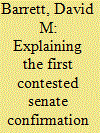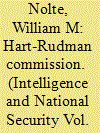|
|
|
Sort Order |
|
|
|
Items / Page
|
|
|
|
|
|
|
| Srl | Item |
| 1 |
ID:
143753


|
|
|
|
|
| Summary/Abstract |
The US developed the capability to see and reproduce photo imagery taken by Soviet satellites crossing the American landmass, according to notes of a conversation between DCI John McCone and Secretary of State Dean Rusk in 1963. We analyze the implications of this conversation, and report results of a literature search to explore how the US might have developed such a capability, and whether it lasted.
|
|
|
|
|
|
|
|
|
|
|
|
|
|
|
|
| 2 |
ID:
143749


|
|
|
|
|
| Summary/Abstract |
This article explores the first nomination for Director of Central Intelligence (DCI) that was seriously contested in the US Senate. Unlike three previous DCIs who headed the Central Intelligence Agency, John A. McCone faced harsh criticism from some in the news media and 12 negative votes in the US Senate after he was nominated for the position by President John F. Kennedy. The article considers factors, including McCone's personal attributes and recent years' controversies about the CIA, as reasons that provoked some opposition to his confirmation as DCI.
|
|
|
|
|
|
|
|
|
|
|
|
|
|
|
|
| 3 |
ID:
143750


|
|
|
|
|
| Summary/Abstract |
Overtaken by a post-crisis atmosphere generated by the terrorist attacks of 11 September 2001, The Hart-Rudman Commission (formally the US Commission on National Security/21st Century) offered a thoughtful, systematic approach to aligning American national security instruments to a modern environment unlike that of the Cold War. More than a decade later, such a review – and such an approach – remains sorely needed.
|
|
|
|
|
|
|
|
|
|
|
|
|
|
|
|
| 4 |
ID:
143746


|
|
|
|
|
| Summary/Abstract |
n December 2014, the US Senate Select Committee on Intelligence (SSCI) released a summary report of its investigation into the Central Intelligence Agency’s (CIA) Detention and Interrogation Program during the ‘war on terror’.1 This amounted to less than a tenth of the full report2 – which remains classified – yet represented the culmination of one of the most contentious investigations in the history of the SSCI, into one of the controversial episodes in the history of the CIA.
|
|
|
|
|
|
|
|
|
|
|
|
|
|
|
|
| 5 |
ID:
143745


|
|
|
|
|
| Summary/Abstract |
The journal of Intelligence and National Security (INS) is now 30 years old. The first issue was published in 1986 under the leadership of the founding editors, historian Christopher Andrew of Cambridge University and military analyst Michael Handel of the US Naval War College. Two more issues would soon follow, making up the first volume of INS. An editorial in the inaugural issue pointed out that this was: ‘the first scholarly, interdisciplinary journal devoted to the past history of intelligence work, to the analysis of its contemporary functions and problems, and to the assessment of its influence on foreign policy and national security’.
|
|
|
|
|
|
|
|
|
|
|
|
|
|
|
|
| 6 |
ID:
143752


|
|
|
|
|
| Summary/Abstract |
Over the last decade, intelligence has become one of the most widely taught subjects in higher education. In response to this, a sub-discipline has emerged within Intelligence Studies devoted to thinking about how the subject is actually taught. One of the most common arguments to come out of this literature is that there should be more practitioner involvement in the university teaching of intelligence. However, it is rarely specified what exactly intelligence professionals bring to the classroom, save the largely self-evident point that because they have ‘walked the walk’, they are uniquely qualified to teach the subject. Drawing on student questionnaires, as well as interviews with serving and retired intelligence officers, this article attempts to probe a little deeper and identify the specific benefits of incorporating practitioners into the university teaching of intelligence. It is argued that practitioners ‘put a face on the profession’ and help to remove some of the mystique and misperceptions that surround intelligence work. It is claimed that practitioners, especially with their ‘inside stories’, give added meaning to academic theories and make the subject more exciting. Finally, it is argued that practitioners enrich the broader ‘student experience’. In UK higher education, now under a new fees regime, students are looking for departments to go the extra mile not only in terms of their teaching, but also in areas like careers advice and support. In this context, intelligence professionals are enormously valuable.
|
|
|
|
|
|
|
|
|
|
|
|
|
|
|
|
| 7 |
ID:
143748


|
|
|
|
|
| Summary/Abstract |
Incidents are the key data for several of the statistical reports and analyses created within the military intelligence community. This paper discusses factors that affect the utility of quantitative methods in military intelligence analysis when used in a low intensity conflict. The first half of the paper presents the general critique of the use of quantitative methods. The second half applies this critique to the case of incident reporting in Afghanistan.
|
|
|
|
|
|
|
|
|
|
|
|
|
|
|
|
| 8 |
ID:
143751


|
|
|
|
|
| Summary/Abstract |
The purpose of this article is to undertake a critical assessment of the governance of Canada's national security apparatus and, more specifically, the growing digitization and data-driven dimensions of such an apparatus. Over the previous decade, since 9/11, the advent of electronic government (e-government) and its emphasis on horizontality and interoperability became intertwined with the security apparatus of the public sector: the recent Snowden affair in the US has once again brought such discussions to the forefront. It is within such a context that the rise of ‘big data’ (or meta-data) as an identifiable term denotes a confluence of forces and contradictory tensions between openness and secrecy for the public sector both operationally and democratically. We examine Canada's Westminster insularity in this regard, how Canadian reforms meant to augment oversight and review capacities of security agencies have been stunted in recent years, and why such stalled actions matter to the privacy and safety of Canadian citizens. Conversely, a case for more openness and governance innovation is put forth premised on two main and inter-related directions: more political oversight and public dialogue on the one hand, and a greater emphasis on privacy as a responsibility on the other hand. Together these directions emphasize a more activist and participative civil culture that is central to ensuring societal resilience in an increasingly virtual and complex security environment.
|
|
|
|
|
|
|
|
|
|
|
|
|
|
|
|
| 9 |
ID:
143747


|
|
|
|
|
| Summary/Abstract |
This article examines Soviet Bloc and Western bugging of their opponents’ diplomatic premises in the early Cold War, from 1945 to the late 1960s. It explains the process of audio surveillance, identifies significant cases of bugging and describes the countermeasures taken by Western states. The paper concludes that the Soviet Union was able to gather a considerable amount of intelligence from bugging Western embassies in Moscow during the early Cold War. In particular, bugging enabled the Soviets to break the diplomatic ciphers of the United States, Britain and West Germany.
|
|
|
|
|
|
|
|
|
|
|
|
|
|
|
|
|
|
|
|
|